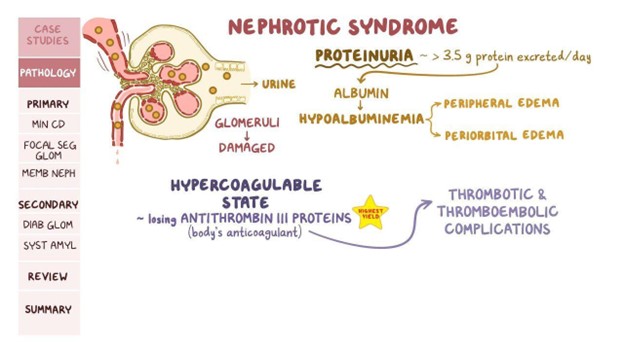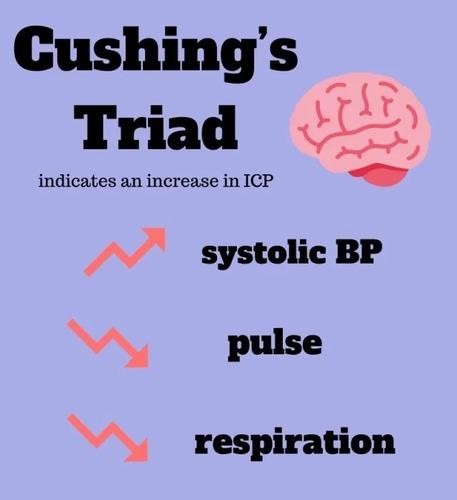Which of the following statements by a mother of a toddler diagnosed with nephrotic syndrome indicates that the mother understands the teaching about the disease?
"We worry about surgery. Do you think we should investigate direct donation of blood?"
"We'll have to encourage lots of liquids. Did you say about Biters per day?"
"My child really likes chips and bologna. I guess we will have to find something else.
We understand the need for antibiotics, hope they can be given orally
The Correct Answer is C
A. "We worry about surgery. Do you think we should investigate direct donation of blood?"
Explanation: This statement doesn't show a clear understanding of nephrotic syndrome. Nephrotic syndrome is a kidney disorder that involves the kidneys' ability to filter blood, but it doesn't typically involve blood donation or surgery related to that. Direct donation of blood is not relevant to the treatment or management of nephrotic syndrome.
B. "We'll have to encourage lots of liquids. Did you say about Biters per day?"
Explanation: This statement suggests a misunderstanding of nephrotic syndrome and its management. Encouraging lots of liquids is generally not a primary concern in nephrotic syndrome. In fact, excess fluid intake might be counterproductive, as it could worsen edema (swelling) that often occurs with this condition. Additionally, the term "Biters per day" doesn't seem relevant to nephrotic syndrome or its management.
C. "My child really likes chips and bologna. I guess we will have to find something else."
Explanation: This statement indicates an understanding of dietary considerations related to nephrotic syndrome. Nephrotic syndrome involves protein loss through the urine, which can lead to low protein levels in the blood. To address this, dietary changes are often recommended to include foods rich in protein. Avoiding high-sodium foods like chips and bologna is also important, as excessive sodium intake can contribute to fluid retention and worsen edema.
D. "We understand the need for antibiotics, hope they can be given orally."
Explanation: This statement doesn't relate to nephrotic syndrome or its management. Nephrotic syndrome primarily involves issues with kidney function and protein loss, and antibiotics are not a standard treatment for this condition. Antibiotics are used to treat infections, which can sometimes be a complication of nephrotic syndrome due to the immune system's vulnerability, but the statement doesn't focus on the understanding of the disease itself.
Correct Answer: C. "My child really likes chips and bologna. I guess we will have to find something else."
Explanation: This statement shows an understanding of the dietary changes needed for a child with nephrotic syndrome. It acknowledges the importance of adjusting the child's diet to include protein-rich foods and avoid high-sodium options, which aligns with the nutritional considerations for managing nephrotic syndrome.

Nursing Test Bank
Naxlex Comprehensive Predictor Exams
Related Questions
Correct Answer is D
Explanation
A. Elevated blood glucose is remarkable with Cushing's Triad:
Elevated blood glucose is not one of the components of Cushing's Triad. The triad focuses on cardiovascular and respiratory changes associated with increased intracranial pressure, not blood glucose levels.
B. Cushing's Triad includes a positive Macawen's sign:
Macawen's sign is not part of Cushing's Triad. Cushing's Triad is specifically related to the physiological responses seen in response to increased intracranial pressure and is not associated with Macawen's sign.
C. Cushing's Triad includes tachycardia, seizures and rapid respirations:
This option is not accurate. Cushing's Triad involves bradycardia (slow heart rate), irregular respirations, and a widening pulse pressure. Tachycardia (rapid heart rate) and seizures are not part of Cushing's Triad but might be indicative of other medical conditions or complications.
D. Bradycardia, irregular respirations and a widening pulse pressure.
Explanation: Cushing's Triad is a set of three clinical signs that are indicative of increased intracranial pressure (ICP) and are considered ominous as they suggest serious brain injury or pathology. The triad consists of:
Bradycardia: This refers to a slow heart rate. As intracranial pressure increases, it can lead to a decreased heart rate due to pressure on the brainstem, which is involved in regulating heart rate.
Irregular Respirations: Increased ICP can affect the brainstem's control over breathing, leading to irregular patterns of breathing, often known as Cheyne-Stokes respiration. This is characterized by periods of rapid breathing followed by apnea (temporary cessation of breathing).
Widening Pulse Pressure: Pulse pressure is the difference between systolic and diastolic blood pressure. An increase in ICP can cause an increase in systolic blood pressure and a decrease in diastolic blood pressure, leading to a widening pulse pressure.

Correct Answer is B
Explanation
A. Dizziness is always a sign of a concussion.
This statement is incorrect. While dizziness can be a symptom of a concussion, it is not always indicative of a concussion. There can be various causes of dizziness, and it is essential to consider other symptoms as well when assessing for a concussion.
B. Bike Helmet Safety
Explanation:
The correct answer to include as part of concussion/head injury prevention teaching to children and parents is "Bike helmet safety." This is because wearing a helmet while riding a bike or participating in other activities that involve head injury risks is crucial to prevent head injuries and concussions. Helmets provide protection to the head by absorbing impact energy and reducing the risk of skull fractures or traumatic brain injuries.
C. Normal fluid intake.
While staying hydrated is important for overall health, it is not directly related to concussion or head injury prevention teaching. This choice is unrelated to the topic.
D. Signs of autism.
Signs of autism are unrelated to concussion or head injury prevention teaching. This choice is not relevant to the topic at hand.
Whether you are a student looking to ace your exams or a practicing nurse seeking to enhance your expertise , our nursing education contents will empower you with the confidence and competence to make a difference in the lives of patients and become a respected leader in the healthcare field.
Visit Naxlex, invest in your future and unlock endless possibilities with our unparalleled nursing education contents today
Report Wrong Answer on the Current Question
Do you disagree with the answer? If yes, what is your expected answer? Explain.
Kindly be descriptive with the issue you are facing.
